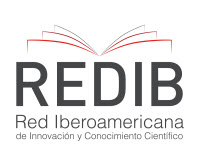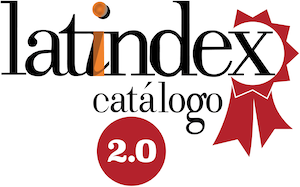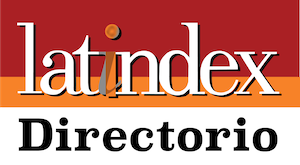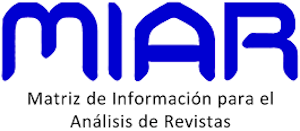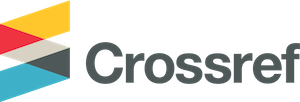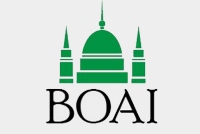EvalMax as an alternative to learning assessment and comprehensive training
DOI:
https://doi.org/10.32645/13906925.1122Keywords:
Learning assessment, EvalMAX, Comprehensive training, Unified General BaccalaureateAbstract
Evaluation in the school system is still an unsolved problem at the secondary level (primary, higher education, and unified general baccalaureate) of the educational institutions of Ecuador. The Ministry of Education regulates students evaluation and promotion. Although the educational model speaks of evaluation by results or achievements of learning. The practice relies on a traditional evaluative approach and quantitative approach without being able to determine individual results. This problem leads to the action research applied as a case study for an educational software called EvalMAX. This method was implemented as an innovative methodology for the evaluation of learning. This led to identifying the level of individualized achievement and at the same time, the comprehensive training of the students. The research followed a mixed approach, with a quasi-experimental design, it was applied to a predetermined group of high school students and a control group. The application of EvalMAX allowed visualizing a performance improvement, raising the individual and group average in terms of the development and scope of skills with performance criteria, established as desired minimums.
References
ACODESI. (2003). La Formación Integral y sus Dimensiones: Texto Didáctico. 16.
Arias Montaño, D. A. (2011). La evaluación educativa: Conceptos, funciones y tipos. https://www.uv.mx/personal/jomartinez/files/2011/08/LA_EVALUACION_EDUCATIVA.pdf
Carbajosa, Diana. (2011). Debate desde paradigmas en la evaluación educativa. Perfiles educativos, 33(132), 181-190.
Díaz-Bravo, L., Torruco-García, U., Martínez-Hernández, M., & Varela-Ruiz, M. (2013). La entrevista, recurso flexible y dinámico. Investigación en educación médica, 2(7), 162-167.
García Muñoz, T. G. (2003). El cuestionario como instrumento de investigación/evaluación. 29.
Hernández Sampieri, R., Fernández Collado, C., & Baptista Lucio, P. (2014). Metodología de la investigación. McGraw-Hill.
Hoyos, G. E. (2014). La evaluación del aprendizaje: Su evolución y elementos en el marco de la formación integral. Revista de Investigaciones · UCM, 14(24), 126-141. https://doi.org/10.22383/ri.v14i2.27
Jorba, J., & Sanmartí, N. (2000). La función pedagógica de la evaluación. Aula de innovación educativa- 19.
Registro oficial 434. Ley_Organica_de_Educacion_Intercultural_LOEI_codificado.pdf. (s. f.). https://educacion.gob.ec/wp-content/uploads/downloads/2017/02/Ley_Organica_de_Educacion_Intercultural_LOEI_codificado.pdf
Ministerio de educación de Colombia. (2017). Plan nacional decenal de educación 2016-2026.
Mora Vargas, A. I. (2004). La evaluación educativa: Concepto, períodos y modelos. Actualidades investigativas en educación, 4(2).
Muskin, J. A. (2015). Evaluación del aprendizaje del estudiante y el currículo: Problemas y consecuencias para la política, el diseño y la aplicación. Reflexiones en progreso, 1. http://repositorio.minedu.gob.pe/handle/123456789/4607
Ministerio de Educación de Ecuador. Propuesta de la comunidad educativa, como insumo para el nuevo Plan Decenal de Educación 2016-2025. (s. f.). https://educacion.gob.ec/wp-content/uploads/downloads/2016/03/PLAN-DECENAL-PROPUESTA.pdf
Quispe Parí, D. J., & Sánchez Mamani, G. (/). Encuestas y entrevistas en investigación científica. Revista de Actualización Clínica Investiga, 490.
Reglamento General a la Ley Orgánica de Educación Intercultural. (2012) Decreto Ejecutivo 1241, publicado en el Suplemento del Registro Oficial No. 754 de 26 de julio de 2012. Ministerio de Educación Ecuador. http://extwprlegs1.fao. org/docs/pdf/ecu168794.pdf
Rincón, J. L. (2004). El perfil del estudiante que pretendemos formar en una institución educativa ignaciana. file:///C:/Users/M.E/Downloads/Rincon,%20J.L.%202003%20-520Perfil%20del%20estudiante%20que%20queremos%20formar%20(1).pdf
Tobón, S. (2013). Formación integral y competencias, pensamiento complejo, currículo, didáctica y evaluación. (4ta ed.). Editorial ECOE.
Torres Bugdud, A., Ruíz Mendoza, J. C., & Álvarez Aguilar, N. (2007). La autotransformación del estudiante universitario: Más allá de la formación integral. 43(4), 9.
UNESCO. (2017). UNESCO | Reporte anual 2016. Oficina Regional de Educación para América Latina y el Caribe. PROVEA. https://www.derechos.org.ve/actualidad/unesco-reporte-anual-2016-oficina-regional-de-educacion-para-america-latina-y-el-caribe
Valverde-Berrocoso, J., Revuelta Domínguez, F. I., & Fernández Sánchez, M. R. (2012). Modelos de evaluación por competencias a través de un sistema de gestión de aprendizaje. Revista Iberoamericana de Educación, 60, 51-62. https://doi.org/10.35362/rie600443
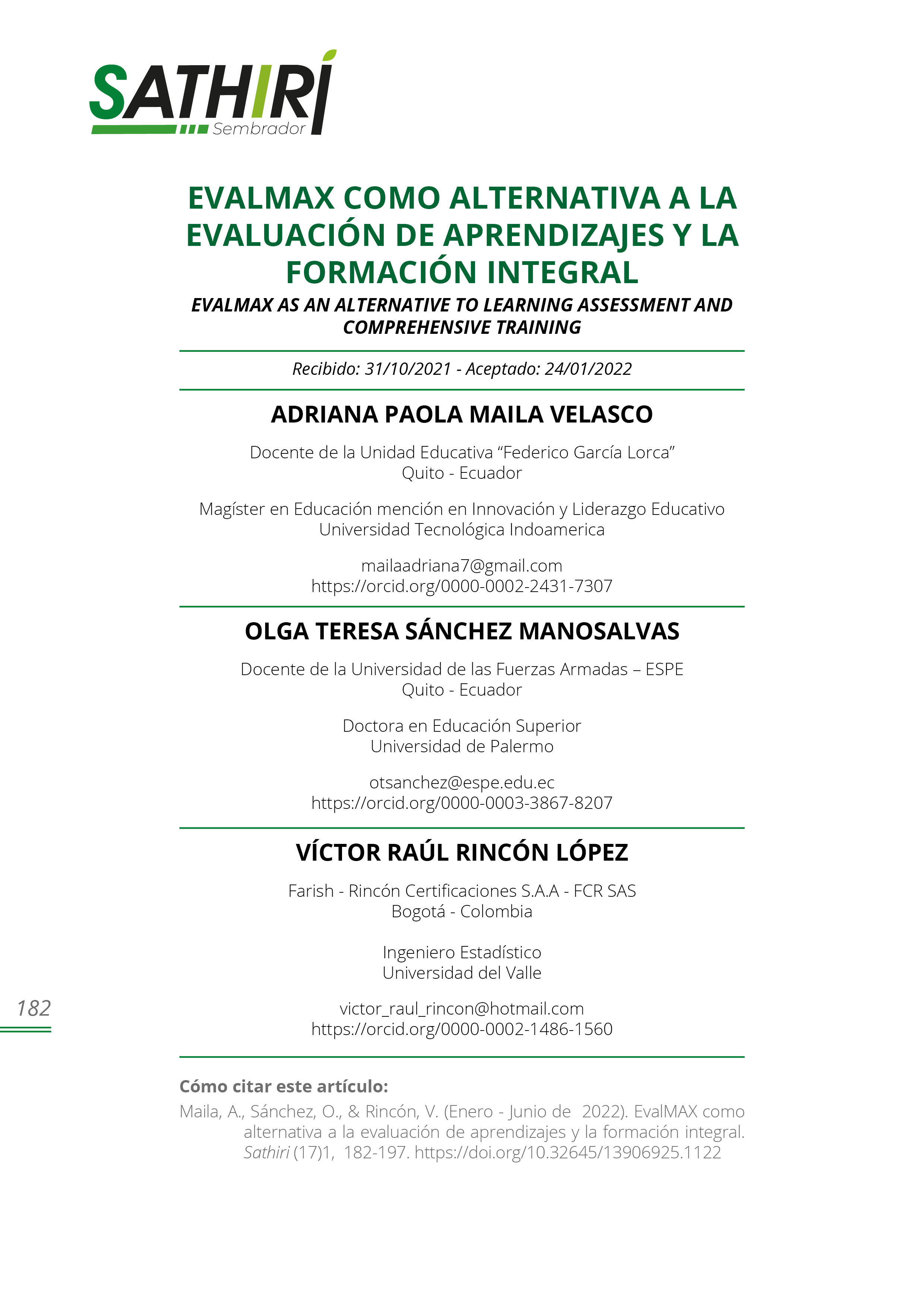
Downloads
Published
Issue
Section
License
Copyright (c) 2022 Adriana Paola Maila Velasco, Olga Teresa Sánchez Manosalvas, Víctor Raúl Rincón López

This work is licensed under a Creative Commons Attribution-NonCommercial-NoDerivatives 4.0 International License.
El autor mantiene los derechos morales e intelectuales de su obra, autorizando a la editorial de la revista Sathiri la difusión y divulgación de su contenido con fines estrictamente académicos y de investigación, sin fines de lucro. Así mismo, se autoriza que la obra sea descargada y compartida con otras personas, siempre y cuando no sea alterada y se reconozca su autoria.






